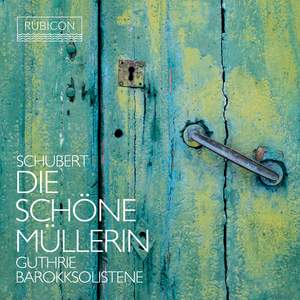Thomas Guthrie writes: “In 2001, I had studied for a PhD at York University under the guidance of the inspirational conductor, musicologist and all-round Lieder lover, Peter Seymour. Our subject was ornamentation in Schubert Lieder. I was a poor student, and never finished it, but my eyes and ears were opened to the idea that Schubert expected his singers to ornament - and adapt in other ways - his music. “I also learnt some of the wider ideas inherent to Rhetoric, an obsession of the literati of the Renaissance (and later). At the heart of this antique science, based on the art of both speech writing and speech giving, is the idea that genuine engagement with an audience demands spontaneity and invention.
“Composers created their music under the influence of this Europe-wide cornerstone of the commonly adopted education system, called the Trivium, which persisted well into the 19th century (Schubert himself was taught entirely in ancient Greek until the age of 15). They were therefore reliant on performers (when they were not the performers of their own music) understanding and embracing one tacitly agreed and fundamental starting point: that music is nothing without the performer and the audience. Storytelling demands us to engage with our whole presence and being.
“The late 19th and 20th century obsession with serving the composer above all else is now seen, in many ways, if not as misguided, then certainly inadequate. Composers writing under the influence of Rhetoric understood that it is impossible to predict the circumstances of every performance, and therefore expected the performer to take their share of the responsibility of making it work. According to the rules of Rhetoric, this should be exactly half of it, right down to questions of tempo, instrumentation, expression and even the notes themselves. In this context, performing Schubert songs in white tie and tails, standing in the crook of a large grand piano in a refined, often large-capacity cultural venue, began to seem to me to be inauthentic, and even contrary to the spirit in which Schubert had composed them. To do so is certainly to offer something quite different to what he would have expected. His songs were written for intimate social occasions, celebrating friendship and storytelling in the most relaxed, offhand and (often) alcohol-fuelled way, with participants bringing instruments and dressing up. In other words, they are not so different to any other examples of music, theatre and storytelling intended to bring people together in real life situations to feel connected, imbued with a sense of belonging and shared moments, and embraced by love and human warmth.
“As we nervously approach the Age of AI, I suspect evenings like these will become even more important, and more desirable. I hope so. My thoughts wander again to the wide-eyed 5-year-old, toasting by the fire, as the story came alive around him. After many years of touring, theatre and song making later, I feel that a lot of what I do is an attempt to recapture the excitement I felt that night. I hope you can feel even a tiny whiff of it as you listen to these songs, which are humbly brought to you with my great friends in the Alehouse Boys, to whom I will always be grateful. Above all, I hope they conjure some sense of the Schubert that perhaps we have come to miss - a lover of relaxed storytelling through friendship, humanity, and intimacy.”





